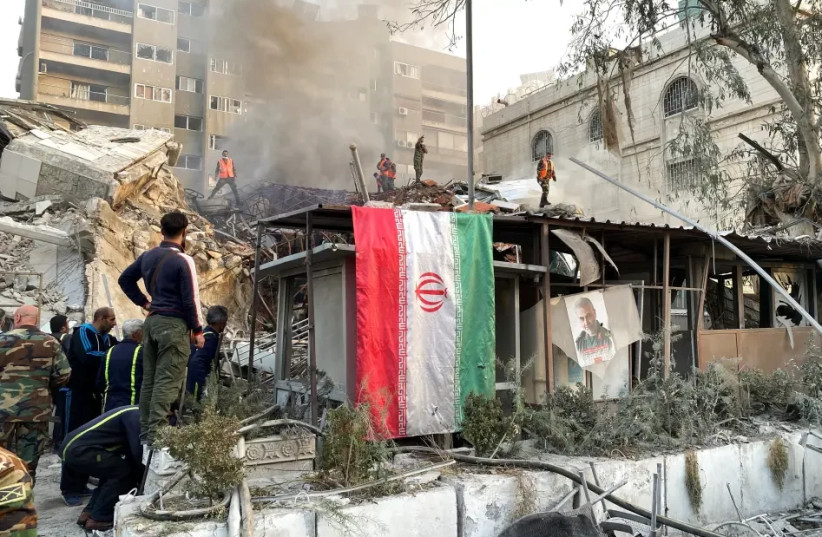The majority of Israelis support the Damascus strike, which Israel has not claimed responsibility for, according to a new survey by The Israel Democracy’s Institute’s Viterbi Family Center for Public Opinion and Police Research published on Sunday.
A total of 514 respondents were interviewed via an internet panel and by telephone in Hebrew and 98 in Arabic. he maximum sampling error was ±4.04% at a confidence level of 95%.
Mohammed Reza Zahedi, the top commander in the Quds Force of the Iranian Revolutionary Guards Corps (IRGC) for Lebanon and Syria was assassinated in an airstrike, The Jerusalem Post reported. He was killed alongside a lieutenant and about five other officers, according to the IRGC. Bloomberg reported that an entire IRGC command wing was killed.
A total of 80% of Jewish Israelis surveyed reported supporting the strike as “the right thing to do.” However, the majority of Arab-Israelis (67%) felt it was “the wrong course of action.”
The consensus among Jewish Israelis remains similar across most of the political spectrum, although those identifying as right-wing are most supportive of the strike comparatively. 90.5% of right-wing Jewish Israelis support the strike, and 77% of politically centred Jewish Israelis. However, only a large minority of left-wing Israelis (45%) believe it was the right course of action.

Palestinian statehood and regional calm
Asked whether Israel should agree to the establishment of a future Palestinian state in exchange for a regional defense agreement, only 26% of Jewish Israelis said they supported the idea. The exchange was far more popular amongst Arab Israelis, 74% backing this trade.
Going against the trend, 69% of left-wing Jewish Israelis would agree to the trade-off. Only 32% of Centrist and 14.5% of right-wing Jewish Israelis would support such a deal.
The future of the Gaza Strip
While internationally little has been decided on who should run the Gaza Strip, once the terrorist leadership is removed, Israelis agree a little more.
Almost half of those surveyed agreed that an international force or the Palestinian Authority should rule the enclave. Around one-quarter said that Israel should maintain a limited military presence in the strip and 19% supported the re-establishment of Jewish settlements in Gaza.
Asked who should rebuild Gaza once the war against Hamas has concluded, 13% of Jewish-Israelis and 63% of Arab Israelis said Israel should be involved in efforts.
A majority of Arab Israelis (68%), and an even larger majority of Jewish Israelis (87%), reported having seen a few or many pictures or videos of the widespread destruction in Gaza. Similar viewing levels were found across the political spectrum among Jews.
Who is really winning the war?
Now over 6 months into the war, Israeli society is divided on who is winning the war: Israel or Hamas. Less than half (43%) of Jewish Israelis think Israel is doing better while the majority of Arab Israeli respondents said they thought Hamas had the upper hand.
Thoughts on the governing of Israel
Most Israelis affirmed that it was time for those responsible for the failings which enabled Hamas’s October 7 attacks to resign. Additionally, the survey found widespread support for early elections to be held.
Over half (51%) of those surveyed agreed with Minister Benny Gantz that elections should be held before the end of 2024. A further quarter answered that elections should be held as scheduled in 2026 and 15% expressed the belief that elections should be held in 2025.
When asked, “In your opinion, does the fact that several families of hostages have joined the protest movement against the government increase or decrease public support for bringing the hostages home now, even if the price being demanded by Hamas is very high?” To which 35% of respondents said they thought that this development serves to decrease public support, 30% that it increases support, and 22% that it has no effect.
The security situation in Israel
Most Jewish Israelis expressed that their mood this Passover was worse than in previous years, a trend which has not extended among Haredim.
Across all religious groups, the largest share of respondents say that they will be undertaking trips, hikes, visits, and leisure activities to a lesser extent during this year’s Passover due to the security situation.
Overall, 39% of Israelis rated their sense of personal security as fairly or very high, compared to 27% who rate their sense of personal security as fairly or very low. A higher rate of Jewish Israelis (43%) say they had a fairly or very high sense of personal security compared to Arab Israelis (16%).
Among both Jewish and Arab Israelis, men (50% of Jews; 23% of Arabs) have a higher sense of personal security than do women (36% of Jews; 10% of Arabs), the survey found.
